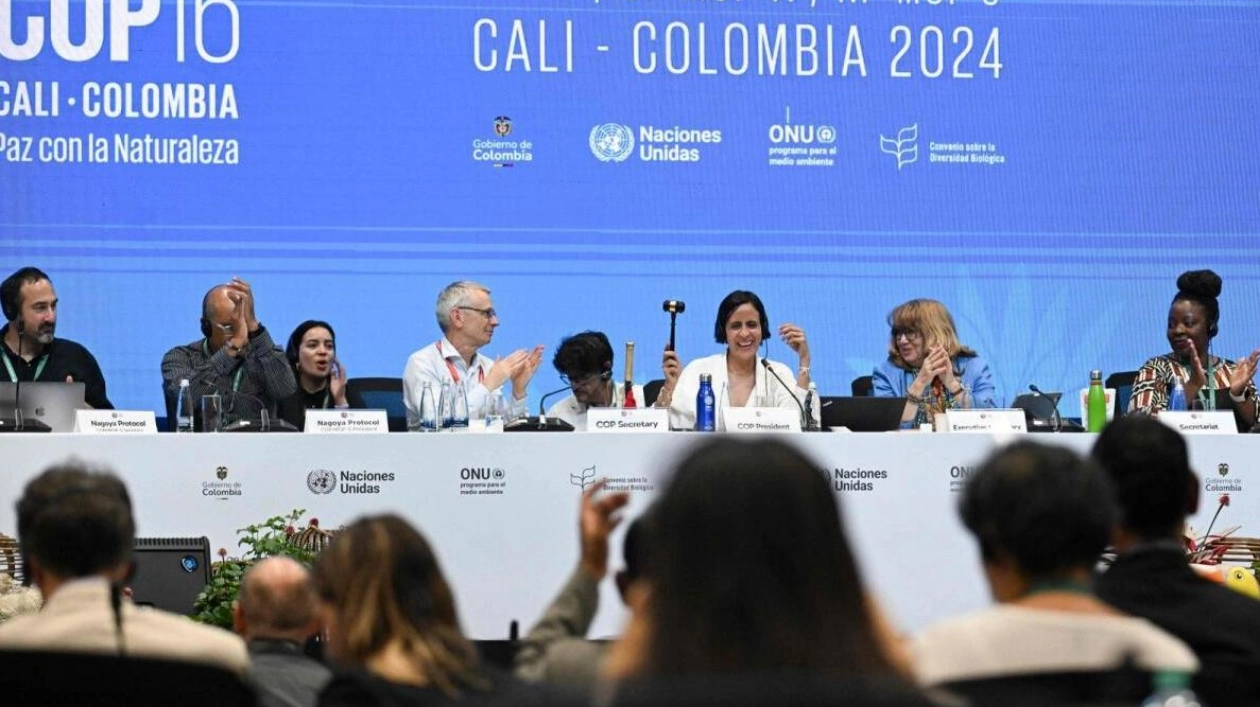David Cooper (C-L), Executive Secretary of the COP16, and Colombian Environment Minister and COP16 President, Susana Muhamad (C-R), were present at the final plenary session of the COP16 Summit in Cali, Colombia, on November 2, 2024. – AFP
The world's largest nature conservation conference concluded in Colombia on Saturday without reaching an agreement on a funding roadmap for species protection. The 16th Conference of Parties (COP16) to the UN's Convention on Biological Diversity (CBD) was suspended by its president, Susana Muhamad, as negotiations extended nearly 12 hours beyond the scheduled time, causing delegates to depart for flights. This exodus left the summit without a quorum for decision-making, but CBD spokesman David Ainsworth informed AFP that the conference will reconvene at a later date to address unresolved issues. The event, the largest of its kind to date, with approximately 23,000 registered delegates, aimed to evaluate and accelerate progress toward the agreement made in Canada two years prior to halt the relentless destruction of natural resources by humankind. The Kunming-Montreal Global Biodiversity Framework, which emerged from that meeting, set 23 targets to be achieved by 2030. These targets include protecting 30 percent of land and sea areas and restoring 30 percent of degraded ecosystems by 2030, reducing pollution, and phasing out agricultural and other subsidies detrimental to nature. The Canada summit also agreed to make $200 billion annually available for biodiversity protection by 2030, including the transfer of $30 billion per year from wealthy to poorer nations. The actual total for 2022 was approximately $15 billion, according to the Organization for Economic Cooperation and Development (OECD). Additionally, nations have pledged about $400 million to the Global Biodiversity Framework Fund (GBFF) established last year to meet UN targets. In Cali, negotiators were divided primarily between poor and rich country blocs as they debated increased funding and other commitments. The most significant request from the summit—to outline a detailed funding plan—proved to be insurmountable. Muhamad, Colombia's environment minister, proposed a draft text suggesting the creation of a dedicated biodiversity fund, which was rejected by the European Union, Switzerland, and Japan. Developing nations insisted on the creation of a dedicated biodiversity fund, arguing that they are inadequately represented in existing mechanisms, including the GBFF, which they also deem too burdensome. The meeting did succeed in establishing a fund to share the profits of digitally sequenced genetic data from plants and animals with the communities from which they originate. Such data, much of it from species found in poor countries, is notably used in medicines and cosmetics that generate billions for developers, with very little of that revenue returning to the source communities. Delegates also approved the creation of a permanent body to represent the interests of Indigenous people under the UN's Convention on Biological Diversity. Representatives of Indigenous peoples, many dressed in traditional attire, celebrated with cheers and chants as the agreement was finalized. However, discussions on biodiversity funding faltered even as new research presented during COP16 indicated that over a quarter of assessed plants and animals are now at risk of extinction. Only 17.6 percent of land and inland waters, and 8.4 percent of ocean and coastal areas, are estimated to be protected and conserved. UN chief Antonio Guterres, who visited Cali for two days with five heads of state and numerous ministers to bolster the talks, reminded delegates that humanity has already transformed three-quarters of Earth's land surface and two-thirds of its waters. "The clock is ticking. The survival of our planet's biodiversity—and our own survival—are at stake," he emphasized. The meeting took place under heavy security due to threats from a Colombian guerrilla group operating near Cali. No incidents were reported.
Source link: https://www.khaleejtimes.com






